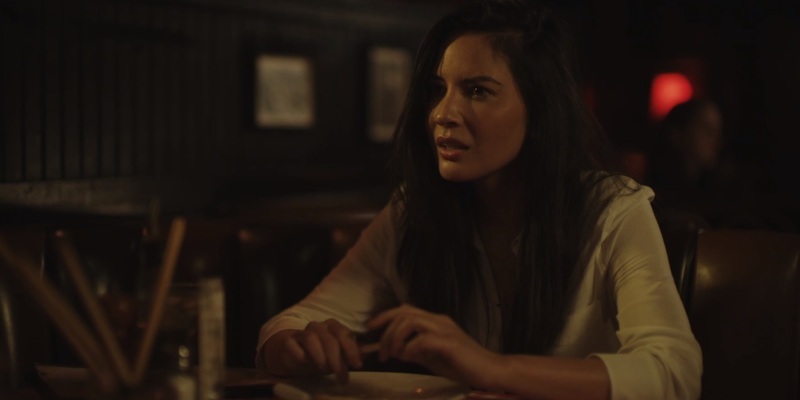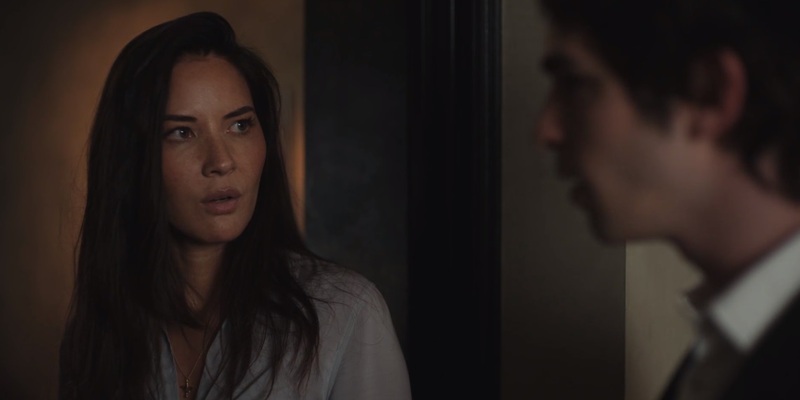
Review by
Eric Hillis
Directed by: Justine Bateman
Starring: Olivia Munn, Luke Bracey, Justin Theroux, Dennis
Boutsikaris, Simon Quarterman

In movies, when a character hears voices in their head it usually means
they're a serial killer, but in truth it's the voice in our head that
stops most of us from becoming sociopaths – it's called a conscience.
Some can be held back by that voice, not from murdering coeds but from
merely following their dreams. But here's the rub – dreams are
unattainable for most of us. Sure, we'd all like to tell our boss to go
fuck himself, but there's the inconvenient problem of keeping a roof
over our heads or feeding our kids.

Written and directed by Family Ties star
Justine Bateman, Violet is blind to the realities
that prevent most of us from following our dreams. Its protagonist is a
successful Hollywood producer played by Olivia Munn. "If this
wealthy woman who looks like a supermodel can follow her dreams, why
can't you?" the film asks. It's Fight Club for readers of
the Oprah endorsed self help scam 'The Secret'. As such,
Violet plays like an adaptation of a self-help manual
rather than a narrative feature film, with clear points where an
instructor might pause the film and ask "What would you do in this
moment?".
The film sees thirtysomething producer Violet (Munn) go through a
series of scenarios in which she is crippled by self-doubt. She lets her
underlings walk all over her. She can't stand up to her misogynistic
boss. She can't profess her feelings to the hunky screenwriter (LOL) (Luke Bracey) she's fallen for. Her self-doubt is relayed in clunky fashion,
verbalised by a voice in her head (Justin Theroux), while her
desires are scrawled on screen in hand-writing. We also get quick cuts
to stock footage of car crashes and rotting animal carcasses accompanied
by screechy industrial noise. It all makes for an information overload
and could easily be dispensed with if a little more faith was placed in
Munn's performance.

Munn is the film's only real strength. In a career best performance,
she's so good here that at times we forget how comparatively privileged
and unrelatable Violet is to the vast majority of people who will watch
this. We don’t need her thoughts to be literally spelled out on screen,
as we can read her body language and facial expressions. But every few
minutes we're reminded that Violet looks like Olivia Munn and is already
living a life far beyond the reach of the average person. There are
practically no stakes for Violet, no consequences for her refusal to
listen to the voice in her head. She has a standing offer of a better
job at a rival studio, so she can tell her Harvey-Weinstein-lite boss to
shove it whenever she wants. She looks like Olivia Munn, so she can pull
her handsome love interest aside at a party for a snog without fear of
rejection. It's all too convenient that Violet decides to strike out on her own now that she's acquired such a degree of comfort and privilege. Had she done so a few years earlier, would she have made it this far?
The lack of showing rather than telling on Bateman's part means we're
often forced to take Violet's word as gospel regarding her relationship
with other characters. She talks about her mother being "not a nice
person", something which brings her into conflict with the rest of her
family. But all we know of Violet's mother is how Violet feels towards
her. Maybe Violet's part of the problem here, or maybe both Violet and
her Mom share the blame equally. It's suggested that Violet is willingly
sleeping with powerful men to advance her career, a detail that seems at
odds with the shrinking, err…Violet she's portrayed as. By the end of
the movie you may well conclude that Violet's vulnerable charm is mostly
courtesy of Munn's winsome appeal, and that maybe she's not as likeable
as the movie would like us to believe.

There are some moments that suggest Violet might have
worked as a '90s HBO show, and it often feels like a hodge-podge of
Dream On, The Larry Sanders Show, Curb Your Enthusiasm and Sex and the City. We get the odd sharply written scene that suggests this is a world
Bateman is familiar with (she's been working in Hollywood since her
teens after all), but in presenting us with a protagonist whom most of
us will envy from the off, Bateman seems tone deaf as to how the rest of
us in that big old 99% really live.


